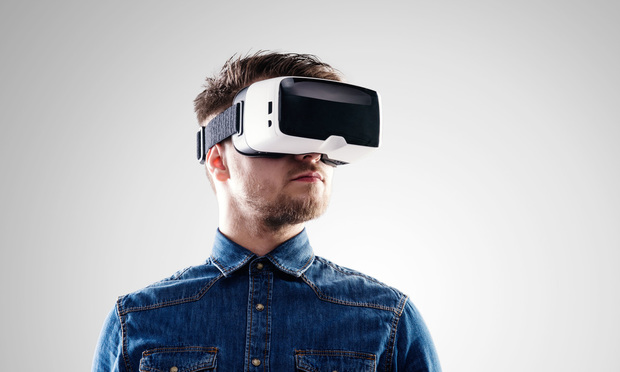Virtual and Augmented Reality's Legal Landmine: User-Generated Data
The content that VR and AR products host—and the data they collect—may put them on a collision course with IP laws.
March 12, 2018 at 10:50 AM
4 minute read
The original version of this story was published on Legal Tech News

From new ways to interact with evidence to different platforms for marketing, virtual reality (VR) and augmented reality (AR) technologies offer a range of possibilities for today's attorneys. But more immediately, they portend the prospect of more work around intellectual property issues.
Though the market for the technology is nascent, legal experts warn that AR and VR products will likely run into a host of IP and privacy issues, given their reliance on using and collecting user-generated data.
Like any interactive platform that allows for user-generated content, AR and VR products will need to closely monitor what is being posted in their virtual spaces. For instance, the use of avatars—graphic icons users choose as their representations on a platform—can open up AR or VR products to IP issues, should an avatar infringe on a protected copyright or trademark.
Kimberly Culp, counsel at Venable, noted that such potential infringement is already happening in the video game industry. “We certainly see in the video game context players who want to use images of companies they like, or games that they like, and the appropriation of those images is arguably a copyright infringement if one wanted to make that argument.”
It is unlikely that AR and VR companies will suffer much liability from user-generated content that infringes on IP, if they adhere to the Digital Millennium Copyright Act (DMCA) rules on policing and sending takedown notices for such content in the first place. But it may not be clear at times whether such content constitutes an infringement.
Christian Mammen, partner at Hogan Lovells, previously told Legaltech News that issues of fair use can become complex when considering content in the AR space.
As an example, he pointed to the “famous picture of Albert Einstein where you see his white hair sticking up in all different directions.” If this image were placed in an AR game, where it was painted on the live world, it is debatable whether this would be a transformative use and, therefore, a fair use of the picture.
Mammen noted that the “question then becomes, is it fair use for that AR game, or does the creator of that game need to obtain some type of rights from the owner of that photograph?”
For VR and AR products, the legal issues that arise with user-generated data don't end with the content its customers produce; they also extend to the data the products may collect from the users themselves.
“Biometric data is certainly one that gives me pause and gives others pause,” Culp said.
She noted that, while “biometrics themselves aren't really a new issue,” what is new is the “vast amount and different types of data AR and VR can and will collect.”
Some VR technology, Culp explained, “can track where you're looking at a particular piece of content and how you are engaging through eye-tracking with content and can provide data back to advertisers.”
The collection and management of such biometrics data can pose privacy and legal questions, especially in light of state statutes such as Illinois' Biometric Information Privacy Act (BIPA) and data privacy laws such as the EU's upcoming General Data Protection Regulation (GDPR).
In addition to collecting biometric data, there may be additional privacy and legal concerns over the “data that AR and VR technology takes in about a user's external surroundings,” Culp said.
Niantic's Pokémon Go AR game, for instance, came under scrutiny by former U.S. Senator Al Franken, D-Minn., over the platform's collection of user location data.
Niantic, which is the target of a class action lawsuit In re Pokemon Go Nuisance Litigation alleging unjust enrichment and common law nuisance over the AR game, responded that it has no plans to sell the data it collects and only provides certain aggregated data report to its sponsors.
This content has been archived. It is available through our partners, LexisNexis® and Bloomberg Law.
To view this content, please continue to their sites.
Not a Lexis Subscriber?
Subscribe Now
Not a Bloomberg Law Subscriber?
Subscribe Now
NOT FOR REPRINT
© 2025 ALM Global, LLC, All Rights Reserved. Request academic re-use from www.copyright.com. All other uses, submit a request to [email protected]. For more information visit Asset & Logo Licensing.
You Might Like
View All
GOP Now Holds FTC Gavel, but Dems Signal They'll Be a Rowdy Minority
6 minute read
'Serious Legal Errors'?: Rival League May Appeal Following Dismissal of Soccer Antitrust Case
6 minute read
28 Firms Supporting Retired Barnes & Thornburg Litigator in Georgia Supreme Court Malpractice Case
7 minute read
How Some Elite Law Firms Are Growing Equity Partner Ranks Faster Than Others
4 minute readTrending Stories
- 1Data Breaches in UK Legal Sector Surge, According to ICO Data
- 2PayPal Faces New Round of Claims; This Time Alleging Its 'Honey' Browser Extension Cheated Consumers
- 3Fired NLRB Member Seeks Reinstatement, Challenges President's Removal Power
- 4NY Inspector General Announces Attorneys Hired to Lead Upstate Region and Gaming
- 5Carol-Lisa Phillips to Rise to Broward Chief Judge as Jack Tuter Weighs Next Move
Who Got The Work
J. Brugh Lower of Gibbons has entered an appearance for industrial equipment supplier Devco Corporation in a pending trademark infringement lawsuit. The suit, accusing the defendant of selling knock-off Graco products, was filed Dec. 18 in New Jersey District Court by Rivkin Radler on behalf of Graco Inc. and Graco Minnesota. The case, assigned to U.S. District Judge Zahid N. Quraishi, is 3:24-cv-11294, Graco Inc. et al v. Devco Corporation.
Who Got The Work
Rebecca Maller-Stein and Kent A. Yalowitz of Arnold & Porter Kaye Scholer have entered their appearances for Hanaco Venture Capital and its executives, Lior Prosor and David Frankel, in a pending securities lawsuit. The action, filed on Dec. 24 in New York Southern District Court by Zell, Aron & Co. on behalf of Goldeneye Advisors, accuses the defendants of negligently and fraudulently managing the plaintiff's $1 million investment. The case, assigned to U.S. District Judge Vernon S. Broderick, is 1:24-cv-09918, Goldeneye Advisors, LLC v. Hanaco Venture Capital, Ltd. et al.
Who Got The Work
Attorneys from A&O Shearman has stepped in as defense counsel for Toronto-Dominion Bank and other defendants in a pending securities class action. The suit, filed Dec. 11 in New York Southern District Court by Bleichmar Fonti & Auld, accuses the defendants of concealing the bank's 'pervasive' deficiencies in regards to its compliance with the Bank Secrecy Act and the quality of its anti-money laundering controls. The case, assigned to U.S. District Judge Arun Subramanian, is 1:24-cv-09445, Gonzalez v. The Toronto-Dominion Bank et al.
Who Got The Work
Crown Castle International, a Pennsylvania company providing shared communications infrastructure, has turned to Luke D. Wolf of Gordon Rees Scully Mansukhani to fend off a pending breach-of-contract lawsuit. The court action, filed Nov. 25 in Michigan Eastern District Court by Hooper Hathaway PC on behalf of The Town Residences LLC, accuses Crown Castle of failing to transfer approximately $30,000 in utility payments from T-Mobile in breach of a roof-top lease and assignment agreement. The case, assigned to U.S. District Judge Susan K. Declercq, is 2:24-cv-13131, The Town Residences LLC v. T-Mobile US, Inc. et al.
Who Got The Work
Wilfred P. Coronato and Daniel M. Schwartz of McCarter & English have stepped in as defense counsel to Electrolux Home Products Inc. in a pending product liability lawsuit. The court action, filed Nov. 26 in New York Eastern District Court by Poulos Lopiccolo PC and Nagel Rice LLP on behalf of David Stern, alleges that the defendant's refrigerators’ drawers and shelving repeatedly break and fall apart within months after purchase. The case, assigned to U.S. District Judge Joan M. Azrack, is 2:24-cv-08204, Stern v. Electrolux Home Products, Inc.
Featured Firms
Law Offices of Gary Martin Hays & Associates, P.C.
(470) 294-1674
Law Offices of Mark E. Salomone
(857) 444-6468
Smith & Hassler
(713) 739-1250








